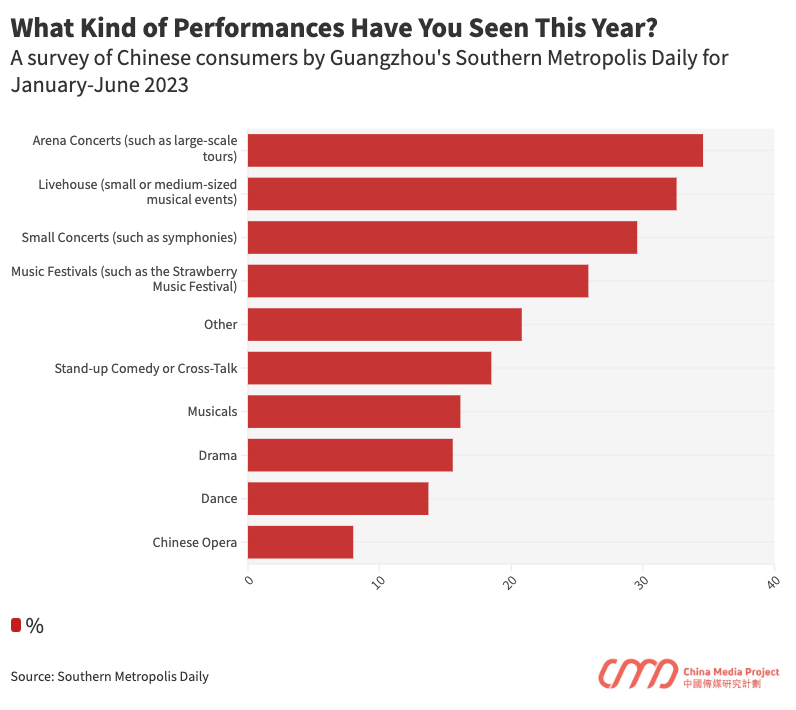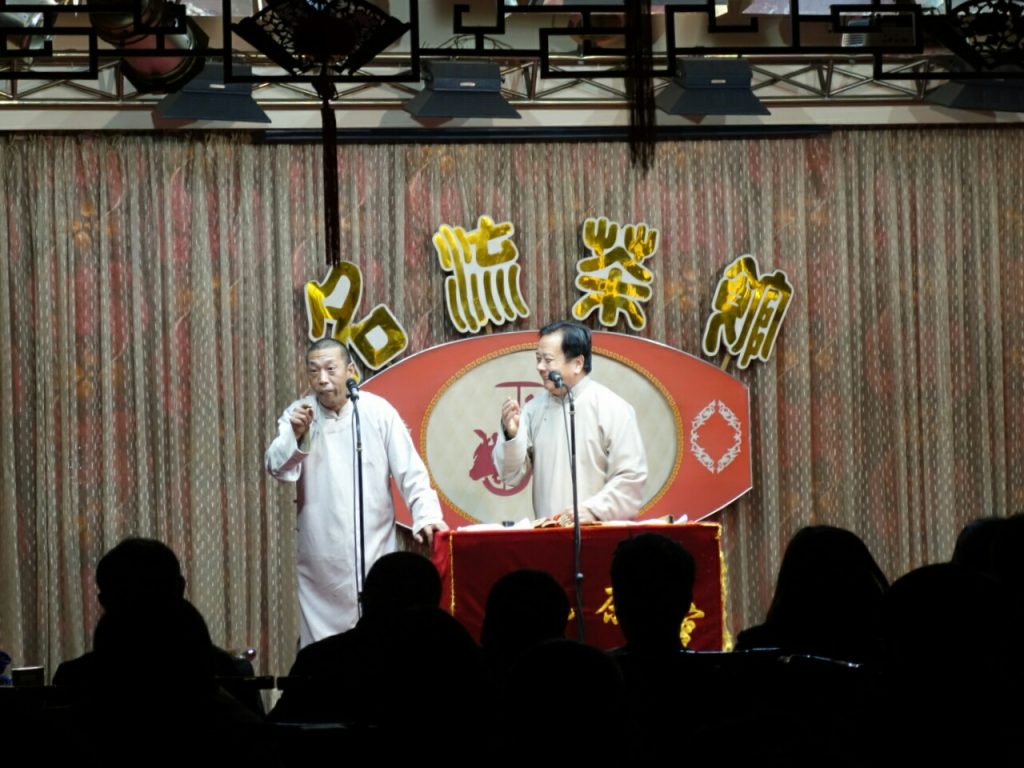
When I first saw Ali Wong’s Netflix special Baby Cobra, I thought to myself, “I didn’t know Asian women were allowed to talk like this in public!” It was raunchy, frank, and hilarious — and it inspired me to go to comedy shows. In 2017, I began doing open mics at Shanghai’s Kung Fu Komedy club.
When I started out, the performers and clientele in Shanghai both skewed heavily expatriate. Most of the jokes hinged on how overwhelming it was to live in China as a foreigner, or even more cringe-worthy material about intercultural dating. Still, I was drawn to the bare-bones nature of the performance format. A dedicated venue with a dark room, good soundproofing, a spotlight, and a good sound system all go a long way. It also helps if the venue sells alcohol. But stand-up comedy doesn’t require a theater: it’s just a comedian with a microphone and an audience.
I believe that making someone laugh is the closest thing to changing someone’s mind.
Kung Fu Komedy was one of the most prominent stand-up comedy venues in Asia at the time, and the only club in mainland China dedicated to stand-up, putting on English-language shows like mine most nights of the week. But by October of 2018, in the lead-up to the first China International Import Expo, the club was shuttered amid a wave of crackdowns on performers’ visas and liquor licenses. The secret to why this happened goes to the heart of what makes stand-up so engaging for performers like me as an art form — even without the glitz and glamor — and why it attracts so much attention from the public.
When a joke lands and a room explodes with laughter, there’s no other feeling in the world quite like it. I believe that making someone laugh is the closest thing to changing someone’s mind.
Stand-Up Steps up
Most expatriate performers at the time were in China on work visas unrelated to stand-up comedy. This effectively made it impossible for non-Chinese (including those from Taiwan, Hong Kong, and Macau) to perform ticketed shows, but stand-up comedians are nothing if not passionate. Despite a lack of financial incentives, many of us still found workarounds to put on unpaid open mics and shows, billing them as community events or language exchange programs rather than professional performances.
We were part of stand-up comedy as it was initially imported and promoted by expatriate communities in Beijing and Shanghai. But even as we were finding creative ways to remain onstage, the medium was steadily rising in China amongst young Chinese professionals.

Televised competitions contributed greatly to the popularization of stand-up in China — shows such as Roast Convention (吐槽大会), which captured audiences in 2016 with comedians competing by insulting each other or celebrities. Another show that contributed to stand-up’s rise is Rock & Roast (脱口秀大会), which first aired in 2017 and went on for five seasons, racking up 2 billion views in the early days of the Covid lockdown, when the country badly needed a laugh.
These shows laid the foundations for a whole generation of stand-up comedians in China, and familiarized audiences with the format. Chinese stand-up comedy took off in a big way thanks to these series, and ticket prices went from a modest 50-100 RMB per show to 1,000 RMB for Chinese comics with millions of followers on Weibo, Douyin, and Xiaohongshu. Within a year from when I started, Kung Fu Komedy was taken over and then surpassed in popularity by GOAT, one of the first Chinese-language comedy clubs in Shanghai.

Stand-up comedy is often translated into Chinese as tuokouxiu (脱口秀), a transliteration of “talkshow,” or dankou xiangsheng (单口相声), a “solo xiangsheng.” The modifier is necessary because the traditional Qing-era art form of xiangsheng, or crosstalk, typically involves two performers who engage in fast-paced clever wordplay, witty puns, and creative banter. It differs from stand-up comedy in many ways, but it does inform the unique styles of Chinese comedians and helps to set expectations for the audience.
Laughing Away the Lockdown
Just as the pandemic was wreaking havoc around the world and making live performances impossible, China was emerging from a cycle of harsh lockdowns back to something resembling normal life. By May of 2020, we were putting on live shows again in Shanghai. China’s closed borders drove away many of the expats who made up the pool of both performers and patrons, but it also gave rise to a new generation of homegrown comedians performing in English.
The government’s inflexible and often arbitrary “zero Covid” measures also had another unexpected side effect: the rise of local comediennes. Unlike chemistry or math, which many in China consider to be subjects men are naturally better at, foreign languages are seen as a “soft” subject better suited to women. So as the number of Chinese comics in English grew, this created a new cohort of female stand-ups.

Stand-up comedy worldwide has long been a male-dominated field, and that gender imbalance was imported to China alongside the format. In Chinese society — as elsewhere — women are expected to be seen but not heard, and well-educated women are often told that they will have trouble finding a husband if they are too outspoken. To be a female stand-up is to seriously defy gender norms. But many Chinese women have found considerable success in the scene, such as Norah Yang, Wang Siwen, and Mengga.
Making Misery Funny
You might wonder: How has stand-up comedy thrived in China in spite of censorship?
Most comics in China focus on social rather than political commentary. When I first started doing open mics in Shanghai, I was immediately briefed on what not to mention, namely the “Three Ts”: Taiwan, Tibet, and Tiananmen Square. But there is still plenty of material to work with. Young Chinese have endured years of soul-crushing education to enter a job market with record-high youth unemployment in the workforce. They’re pressured to succeed professionally then urged to marry and reproduce. There’s plenty to complain about, and comedians excel at making misery funny.
Stand-up comedy in China has thrived largely because most performers are cognizant of the CCP’s redlines and are careful never to cross them. A Western comedian who oversteps them might get “canceled” by fans, but when a Chinese comic ends up on the wrong side of the line the consequences are severe, and venues and organizers are often implicated as well. No one wants to be the one who wanted to be edgy one night and ended up ruining the scene for the whole community.

Just this May, renowned comedy club Xiaoguo was slapped with a US$2 million fine for a joke that happened to reference the People’s Liberation Army. The comedian who made the quip, Li Haoshi, was also put under police investigation.
Comedians who perform in places free from such censorship concerns often prohibit filming or audio recording at shows, some going as far as organizing “device-free” events to protect their material from being “burned” on social media. This refers to a joke that’s been released in a TV special or comedy album and is no longer usable in future performances. Chinese comedians, however, have to fear being “burned” themselves if recordings of their routines get out.
There’s plenty to complain about, and comedians excel at making misery funny.
Social media is a double-edged sword for a stand-up. On the one hand, punchy stand-up material makes for great short-form video content; but on the other hand, the greater the audience a joke reaches, the more it attracts official scrutiny. In the case of Li Haoshi, the actual video footage was not what got him into trouble — it was an audience member’s social media post complaining about the joke. That was enough to stir up netizens’ ire and invite police attention.
The crackdown that followed the Li Haoshi incident has led some to declare the death of comedy in China. But the art form has weathered worse since the sounds of xiangsheng first echoed in the alleys and lanes of the imperial capital. The risks make every show’s value truly felt, every hard-earned moment of expression cherished. And thanks to the simplicity and agility of the format, I have every confidence that stand-up in China will once again rise to its feet.




















